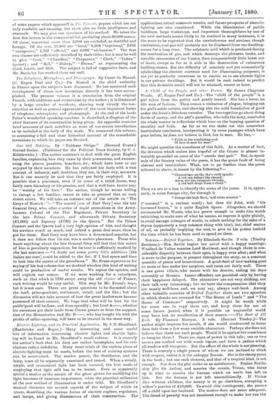Electric Lighting, and its Practical Application. By J. N. Shoolbred.
(Hardwicke and Bogue.)—Many interesting and some useful bits of information concerning electric lights and electric light- ing will be found in Mr. Shoolbred's small volume. It is scarcely the author's fault that his data are rather incomplete, and his con- clusions rather indefinite. Many more trials of the various plans of electric-lighting must be made, before the best of existing systems can be ascertained. The motive power, the distributor, and the lamp, must all be separately examined and tested. When a steady, ample, and economical light has been secured, the best mode of employing that light still has to be learnt. Even so apparently trivial a matter as the nature of the glass globes for modifying the light becomes of immense importance, when the practical utilisation of the new method of illumination is under trial. Mr. Shoolbred's manual discusses the several aspects of the subject of which he treats, describing the various forms of electric engines, regulators, and lamps, and giving illustrations of their construction. The
applications, actual economic results, and future prospects of electric- lighting are also considered. While the illumination of public buildings, large workshops, and important thoroughfares by one of the new methods seems likely to be realised in many instances, it is the more to be regretted that the unwholesome and noxious, though convenient, coal-gas will probably not be displaced from our dwelling- rooms for a long time. The sulphuric acid which is produced during the combustion of gas, and which destroys the pictures, books, and metallic ornaments of our houses, does comparatively little harm out of doors, except so far as it aids in the destruction of calcareous building-stones. Bat the difficulty of minutely and yet economically subdividing the electric currents used for illuminating purposes, is not yet so perfectly overcome as to enable us to use electric lights in oar private dwellings. But it would be rash indeed to predict that this desirable result will not be attained, sooner or later.


































 Previous page
Previous page